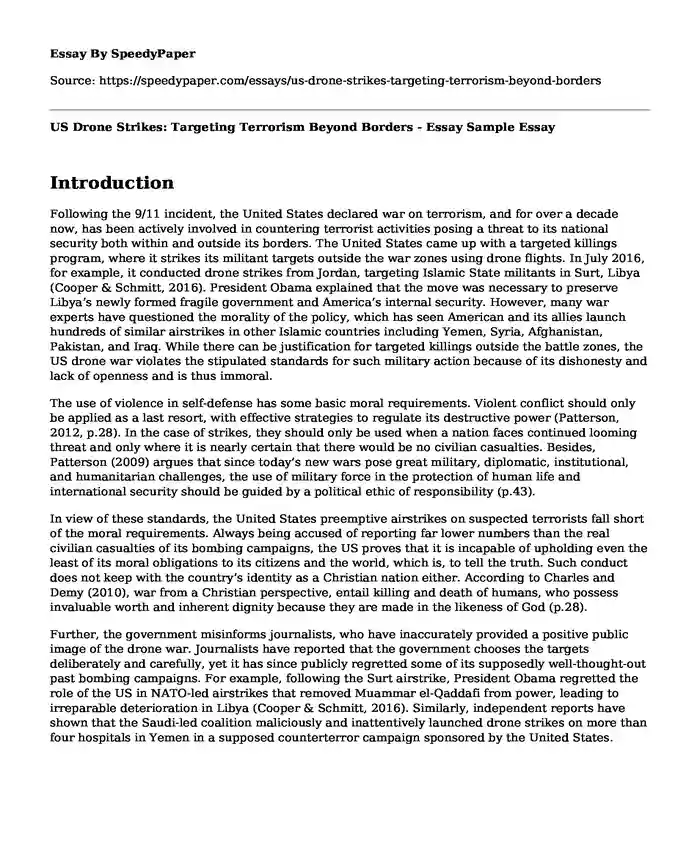
| Type of paper: | Essay |
| Categories: | United States Terrorism Technology |
| Pages: | 3 |
| Wordcount: | 717 words |
Introduction
Following the 9/11 incident, the United States declared war on terrorism, and for over a decade now, has been actively involved in countering terrorist activities posing a threat to its national security both within and outside its borders. The United States came up with a targeted killings program, where it strikes its militant targets outside the war zones using drone flights. In July 2016, for example, it conducted drone strikes from Jordan, targeting Islamic State militants in Surt, Libya (Cooper & Schmitt, 2016). President Obama explained that the move was necessary to preserve Libya’s newly formed fragile government and America’s internal security. However, many war experts have questioned the morality of the policy, which has seen American and its allies launch hundreds of similar airstrikes in other Islamic countries including Yemen, Syria, Afghanistan, Pakistan, and Iraq. While there can be justification for targeted killings outside the battle zones, the US drone war violates the stipulated standards for such military action because of its dishonesty and lack of openness and is thus immoral.
The use of violence in self-defense has some basic moral requirements. Violent conflict should only be applied as a last resort, with effective strategies to regulate its destructive power (Patterson, 2012, p.28). In the case of strikes, they should only be used when a nation faces continued looming threat and only where it is nearly certain that there would be no civilian casualties. Besides, Patterson (2009) argues that since today’s new wars pose great military, diplomatic, institutional, and humanitarian challenges, the use of military force in the protection of human life and international security should be guided by a political ethic of responsibility (p.43).
In view of these standards, the United States preemptive airstrikes on suspected terrorists fall short of the moral requirements. Always being accused of reporting far lower numbers than the real civilian casualties of its bombing campaigns, the US proves that it is incapable of upholding even the least of its moral obligations to its citizens and the world, which is, to tell the truth. Such conduct does not keep with the country’s identity as a Christian nation either. According to Charles and Demy (2010), war from a Christian perspective, entail killing and death of humans, who possess invaluable worth and inherent dignity because they are made in the likeness of God (p.28).
Further, the government misinforms journalists, who have inaccurately provided a positive public image of the drone war. Journalists have reported that the government chooses the targets deliberately and carefully, yet it has since publicly regretted some of its supposedly well-thought-out past bombing campaigns. For example, following the Surt airstrike, President Obama regretted the role of the US in NATO-led airstrikes that removed Muammar el-Qaddafi from power, leading to irreparable deterioration in Libya (Cooper & Schmitt, 2016). Similarly, independent reports have shown that the Saudi-led coalition maliciously and inattentively launched drone strikes on more than four hospitals in Yemen in a supposed counterterror campaign sponsored by the United States.
Conclusion
In conclusion, there is no denying that there can be situations where targeted killings would be the only way to avert planned terrorist activities. Suicide bombers, for example, cannot be taken alive because they plan to die in the attack. It is also true that the moral standards for targeted killings allow civilian casualties proportionate to the magnitude of the security threat. However, the US targeted killings program is deliberately surrounded by intense secrecy to prevent the public from truly assessing its morality. The lack of openness on the part of the government can only mean that it is knowingly abdicating its moral duties to uphold justice in its war on terror.
References
Charles, J. D., & Demy, T. J. (2010). War, peace, and Christianity: Questions and answers from a just-war perspective. Crossway.
Cooper, H., & Schmitt, E. (2016, August 3). U.S. strikes help Libyan forces against ISIS in Surt. The New York Times - Breaking News, World News & Multimedia. https://www.nytimes.com/2016/08/03/us/politics/drone-airstrikes-libya-isis.html?_r=0&auth=linked-google
Patterson, E. (2009). Just war thinking: Morality and pragmatism in the struggle against contemporary threats. Lexington Books.
Patterson, E. D. (2012). Ending wars well: Order, justice, and conciliation in contemporary post-conflict. Yale University Press.
Cite this page
US Drone Strikes: Targeting Terrorism Beyond Borders - Essay Sample. (2023, Sep 30). Retrieved from https://speedypaper.com/essays/us-drone-strikes-targeting-terrorism-beyond-borders
Request Removal
If you are the original author of this essay and no longer wish to have it published on the SpeedyPaper website, please click below to request its removal:
- Book Review Essay Sample. Ta-Nehisi Coates - Between the World and Me
- Free Paper with Annotated Bibliography: Significance of Federalism in the History of the United States
- Essay Sample on New Interfaces and New Interactions
- Free Essay Sample: Union or Strike
- Free Essay on Best Practices Used in Designing and Establishing an Enterprise WLAN
- Paper Example on The Battle for Power: Federalists vs Non-Federalists in the US Constitution
- Paper Example on Unveiling Racism: Individual and Institutional Struggles in the United States
Popular categories




